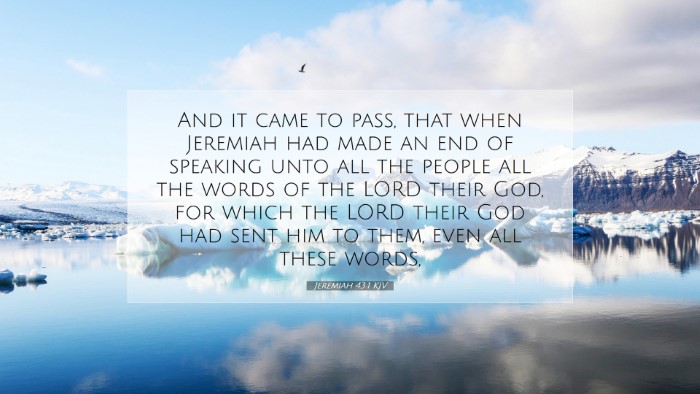Commentary on Jeremiah 43:1
The prophetic narrative in Jeremiah 43:1 is a pivotal moment in the unfolding drama of the Hebrew people's history. This verse reads:
"And it came to pass, that when Jeremiah had made an end of speaking unto all the people all the words of the Lord their God, for which the Lord their God had sent him to them, even all these words,"
setting the stage for significant actions and conflicting choices.
Context and Background
To fully appreciate the implications of this verse, it is crucial to consider the historical context in which it is situated. Jeremiah, known as the weeping prophet, faced considerable opposition in his ministry—largely due to his messages of impending judgment and the necessity of repentance. His exhortations to the people of Judah had been met with resistance, as they grappled with their own fears and desires against the backdrop of a tumultuous political landscape.
Analysis of the Verse
The phrase “when Jeremiah had made an end of speaking” denotes the conclusion of a significant moment where divine messages were communicated. This signifies a transition point where God’s words had been delivered but received with varying degrees of acceptance.
Matthew Henry emphasizes the importance of this divine communication, noting how it illustrates the steadfastness of God's message through Jeremiah, despite the people's disobedience. Henry notes that Jeremiah's commitment to conveying God's word highlights the urgency of repentance—an issue central to Jeremiah's ministry.
Albert Barnes expands on this notion by detailing the content of the words spoken by Jeremiah, which included warnings of destruction and calls for humility and submission to Babylonian rule. Barnes points out that the rejection of these messages by the populace reveals the hardened hearts typical of a rebellious society.
Adam Clarke emphasizes the historical ramifications of this prophetic declaration, drawing attention to the sociopolitical circumstances surrounding Jerusalem's fall. Clarke argues that Jeremiah’s words served not only as warnings but as a foretelling of events that would indeed come to pass, demonstrating the prophet's role as a divine intermediary.
Key Themes
- Divine Communication: The ministry of Jeremiah underscores the importance of prophecy and the weight of God’s message, a theme prevalent throughout Scripture.
- Resistance to God’s Word: The reaction of the people ultimately showcases a consistent biblical motif—the struggle between divine truth and human obstinacy.
- Consequences of Disobedience: The events that unfold following this prophetic utterance bear witness to the dire consequences that come from disregarding God's instructions.
Theological Implications
The theological implications of Jeremiah 43:1 are profound. It invites scholars and theologians to reflect on the nature of prophetic ministry, the dynamics of human response to divine revelation, and the critical calling to embrace God's sovereignty.
Personal Reflection: This verse challenges individuals to consider their own responses to God’s leading. Are we attentive to His word, or do we ignore it in pursuit of our own desires? The reflection of how ancient Israel responded can serve as a mirror for contemporary spiritual lives.
Conclusion
Jeremiah 43:1 serves as a profound reminder of the ongoing dialogue between God and His people. It illustrates the tension inherent in prophetic proclamation and human recalcitrance, a theme that resonates deeply within the narrative of Scripture.
The insights drawn from the commentaries of Matthew Henry, Albert Barnes, and Adam Clarke show that this ancient text continues to hold relevance for today’s readers—calling everyone back to a place of humility and obedience before God.


